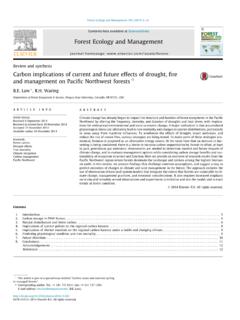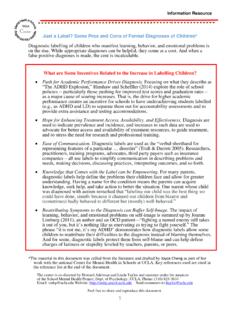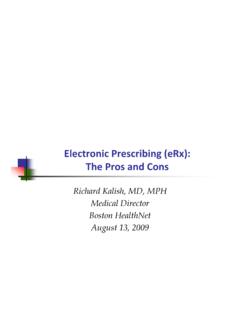Transcription of Pros and cons of labeling genetically engineered (GE) crops
1 Pros and cons of labeling genetically engineered (GE). crops Steve Strauss Distinguished Professor Oregon State University Should GMO-crop derived food have a mandatory label, vs. the common voluntary non-GMO labels (organic, non-GMO)? labeling summary - Oregon Anything with GMO product must be labeled prominently No identity of quantity or kind of GMO, crop it came from, or if a gene or protein is present vs. absent ( , sugar and oil also labeled). Restaurant, cafeteria food exempted, as is dairy and meat from animals fed GMO grains/feed (~2/3 of food eaten). Government must monitor to assure compliance Only Vermont has a similar active labeling law, on hold due to lawsuit from major food companies, but others under consideration in other states Pros vs. cons of mandatory GMO labels Pro viewpoints Right to know, period Tool to track problems Ethics (keep animal DNA out of food of vegetarians).
2 Many other countries are doing it Reduce GMOs in food supply to protect against chemical use, toxins from herbicide and insect resistant crops that are widespread Reduce power, prominence of large ag companies in food and farming Adapted from: Pros vs. cons of mandatory GMO labels Con viewpoints Method is what is regulated but safe as other breeding according to FDA, National Academy of Sciences GE already intensively regulated/scrutinized already by US government, far more than conventional crops We have a labeling law already in place (FDA) for changes that matter ( material changes to nutrition, safety get a label, whether positive or negative). Organic already GMO-free and widely available to consumers who wish to choose non-GMO. No health benefits from poor tracking, exemptions Adapted from: Pros vs. cons of mandatory GMO labels Con viewpoints A prominent and mandatory label, as required in the Oregon ballot measure, has been shown in scientific studies to mislead/scare/stigmatize consumers (viewed as warning label).
3 Improved products also stigmatized, kept from market labeling increases cost of food for all consumers (estimates vary, but some estimates are very high). This is unethical because it hits the poor hardest Reduces choice by loss of GMO products, as has been observed in Europe (food system cannot infrastructure cannot support GMO and non-GMO. options for most foods), companies often avoid danger to their brand Adapted from: Those who fund and write labeling ballot measures are interested in removing GMO technology The largest organization of scientists in the USA and the world AAAS . does not support labels Legally mandating such a label can only serve to mislead and falsely alarm consumers . The NY Times, Oregonian and most other mainstream news organizations have not supported labeling measures










